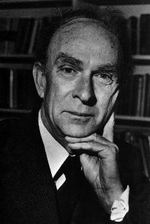 Peter Frederick Strawson, British philosopher, a graduate of Oxford, was born in 1919.
Peter Frederick Strawson, British philosopher, a graduate of Oxford, was born in 1919.
An influential spokesman for so-called ordinary language philosophy, he began teaching at Oxford in 1947 and from 1968 to 1987 was Waynflete Professor of Metaphysics.
In an early article, “On Referring” (Mind, 1950), he disputed Bertrand Russell’s theory of definite descriptions, drawing a distinction between referring to an entity and asserting its existence.
He also disputed, on linguistic grounds, the correspondence theory of truth, maintaining that a “fact” is not something that corresponds to a true statement but something stated; facts are not something to which statements refer, rather “facts are what statements (when true) state.”
In his first book, Introduction to Logical Theory (1952), Strawson studied the relationship between common language and the language of formal logic.
Later his concern shifted to what he calls descriptive metaphysics, a description of the actual structure of our thought about the world. His development of and work in this area revived interest in metaphysics as a respectable philosophic enterprise.
Major Works of Peter Frederick Strawson
– Introduction to Logical Theory (1952)
– Individuals (1965)
– The Bounds of Sense (1966)
– Logico-Linguistic Papers (1971)
– Freedom and Restraint (1974)
Early years
Strawson was born in Ealing, west London, and brought up in Finchley, north London, by his parents, both of whom were teachers. He was educated at Christ’s College, Finchley, followed by St John’s College, Oxford, where he read Philosophy, Politics and Economics.
Philosophical work
Strawson first became well known with his article “On Referring” (1950), a criticism of Bertrand Russell’s theory of descriptions (see also Definite descriptions) that Russell explained in the famous “On Denoting” article (1905).
In philosophical methodology, there are (at least) two important and interrelated features of Strawson’s work that are worthy of note.[6] The first is the project of a ‘descriptive’ metaphysics, and the second is his notion of a shared conceptual scheme, composed of concepts operated in everyday life. In his book Individuals (1959), Strawson attempts to give a description of various concepts that form an interconnected web, representing (part of) our common, shared, human conceptual scheme. In particular, he examines our conceptions of basic particulars, and how they are variously brought under general spatio-temporal concepts. What makes this a metaphysical project is that it exhibits, in fine detail, the structural features of our thought about the world, and thus precisely delimits how we, humans, think about reality.
Strawson was made a Fellow of the British Academy in 1960 and Foreign Honorary Member of the American Academy of Arts and Sciences in 1971. He was president of the Aristotelian Society from 1969 to 1970. He was knighted, in 1977, for services to philosophy.
Personal life
After serving as a captain in the Royal Electrical and Mechanical Engineers during World War II, Strawson married Ann Martin in 1945. They had four children, including the philosopher Galen Strawson. P.F. Strawson lived in Oxford all his adult life and died in hospital on 13 February 2006 after a short illness. He was elder brother to Major General John Strawson.
The obituary in The Guardian noted that “Oxford was the world capital of philosophy between 1950 and 1970, and American academics flocked there, rather than the traffic going the other way. That golden age had no greater philosopher than Sir Peter Strawson.”[7]
In its obituary, The Times of London described him as a “philosopher of matchless range who made incisive, influential contributions to problems of language and metaphysics.”[8] The author went on to say:
Few scholars achieve lasting fame as dramatically as did the philosopher Sir Peter Strawson. By 1950 Strawson, then a Fellow of University College, Oxford, was already a respected tutor and a promising member of the group of younger Oxford dons whose careful attention to the workings of natural languages marked them out as ‘linguistic’ philosophers. [He published] extraordinary papers, which are still read and discussed more than 50 years later and which are prescribed to tyros as models of philosophical criticism.

Thanks for sharing excellent informations. Your site is very cool. I am impressed by the details that you’ve on this blog. It reveals how nicely you understand this subject. Bookmarked this website page, will come back for extra articles. You, my pal, ROCK! I found just the information I already searched all over the place and simply couldn’t come across. What a great web site.